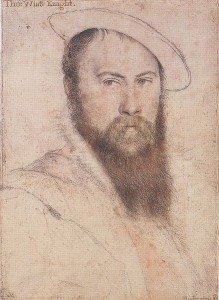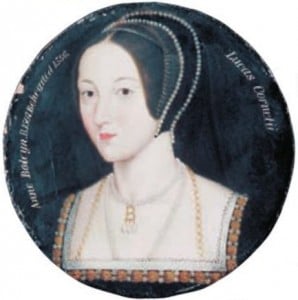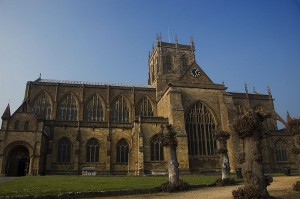 On this day in history, 11th October 1542, Tudor poet, Sir Thomas Wyatt the Elder, died at Sherborne in Dorset. Wyatt was just 39 years old at his death but his poetry, and that of his friend, Henry Howard, Earl of Surrey, is still enjoyed the world over today, although the majority of his work was not published in his lifetime. Literary critic, and author of two books on Wyatt, Patricia Thompson, calls Thomas Wyatt “the Father of English Poetry” and he is known for introducing the sonnet into English.
On this day in history, 11th October 1542, Tudor poet, Sir Thomas Wyatt the Elder, died at Sherborne in Dorset. Wyatt was just 39 years old at his death but his poetry, and that of his friend, Henry Howard, Earl of Surrey, is still enjoyed the world over today, although the majority of his work was not published in his lifetime. Literary critic, and author of two books on Wyatt, Patricia Thompson, calls Thomas Wyatt “the Father of English Poetry” and he is known for introducing the sonnet into English.
Background
Sir Thomas Wyatt was born in 1503 at Allington Castle, Kent. His father, Henry Wyatt, was a Lancastrian who had been imprisoned during Richard III’s reign, but released on the accession of Henry VII who rewarded him with many grants and titles. His mother was Anne Skinner, daughter of John Skinner of Reigate, a woman famed for her hospitality. Henry Wyatt became a Privy Councillor under Henry VII and acted as an executor for the King’s will on his death in 1509. He went on to serve the new king, Henry VIII and was made a Knight of the Bath at his coronation in June 1509.
Little is known of Thomas Wyatt’s childhood, apart from the story of the lion. It is said that Wyatt, or his father, were raising a lion cub as a pet when it turned on Wyatt and attacked him. Wyatt had the presence of mind to grab his rapier and run it through the lion’s heart. When Henry VIII heard of this story, he commented “Oh, he will tame lions”.
Wyatt at Court
In 1516, Wyatt served as a sewer extraordinary at the Princess Mary’s christening, along with his friend Thomas Poynings, and later that year was sent to St John’s College, Cambridge, a college known for Humanism. In 1520, Wyatt married Elizabeth Brooke, the daughter of Lord Cobham, and the couple had a son, Thomas Wyatt the Younger, in 1521. The Duke of Norfolk stood as a godfather at the baby’s christening.
In 1524, Wyatt followed his father’s example and started a career at court as Clerk of the King’s jewels. In 1525 he was made Esquire of the Body and he went on to become an ambassador, undertaking many foreign missions for his master, King Henry VIII, including one to France in 1526 and one to the Papal Court in Rome in 1527, an embassy to try to convince Pope Clement VII to annul the King’s marriage to Catherine of Aragon. In 1528 he was made High Marshal of Calais and in 1532 he was made Commissioner of the Peace in Essex. Wyatt was also one of the men chosen to accompany the King and Anne Boleyn on their visit to France in late 1532 and he served Anne at her coronation in the summer of 1533. He was knighted in 1535.
 Thomas Wyatt and Anne Boleyn
Thomas Wyatt and Anne Boleyn
Wyatt’s marriage to Elizabeth Brooke was not a happy one and the couple separated around 1525. Josephine Wilkinson, author of “The Early Loves of Anne Boleyn”1, writes of how it appears that Wyatt fell in love with Anne Boleyn when she arrived at the English Court in 1522. Wyatt’s grandson, George Wyatt, later wrote that when Thomas Wyatt first saw Anne he was “surprised by the sight thereof”2. It was love at first sight for Thomas, but Anne, at this time, was in love with Henry Percy and by 1526 she had a new admirer, the King.
There is no evidence that Anne Boleyn and Thomas Wyatt were lovers, but some of Wyatt’s poems suggest that he had feelings for Anne. His riddle poem “What wourde is that that chaungeth not” has the answer “Anna”, in “The Lover Confesseth Him in Love with Phyllis” he writes of “That Brunet” which is thought to refer to Anne and his famous “Whoso list to hunt” tells of a man (Wyatt) hunting a hind with little chance of success, and then withdrawing from the hunt because of another hunter. If Anne is the hind, then Wyatt is talking of withdrawing his suit of Anne because she is now the property of the King “Noli me tangere; for Caesar’s I am.”
Although these poems suggest unrequited love, The Spanish Chronicle3 tells a story of Wyatt visiting Anne at her home at Hever. He finds her in bed, kisses her and touches her breast, but is stopped from going any further by a stamping noise from upstairs, the stamping of Anne’s lover who has become impatient waiting for her! I don’t think it is likely that there is any truth in this story! Another story is told by George Wyatt4. In this story, Thomas Wyatt was entertaining Anne Boleyn with his poetry while she did needlework. Wyatt noticed a jewel hanging from Anne’s pocket and playfully snatched it off her and decided to keep it as a trophy. Some time later, Wyatt was playing bowls with the King, the two of them arguing over a shot. Wyatt declared that the shot was his but the King declared “Wyatt, I tell thee it is mine”, pointing to the wood with the finger on which he was wearing Anne’s ring. Wyatt, seeing Anne’s ring, replied, “If it may like your majesty to give me leave to measure it, I hope it will be mine”, and then took Anne’s jewel from around his neck and began to measure the cast with its ribbon. The King was furious when he saw Anne’s jewel. He broke up the game and then went in search of Anne for an explanation.
Wyatt and the Fall of Anne Boleyn – Circa Regna Tonat
According to The Spanish Chronicle, Thomas Wyatt was apprehended by Thomas Cromwell, by order of the King, at the May Day joust in 1536. However, he is not mentioned as a prisoner by Sir William Kingston, Constable of the Tower of London, until 5th May. In The Spanish Chronicle report, Cromwell examines Wyatt:-
“When they arrived in London Cromwell took Master Wyatt apart, and said to him, “Master Wyatt, you well know the great love I have always borne you, and I must tell you that it would cut me to the heart if you were guilty in the matter of which I wish to speak.” Then he told him all that had passed; and Master Wyatt was astounded, and replied with great spirit, “Sir Secretary, by the faith I owe to God and my King and lord, I have no reason to distrust, for I have not wronged him even in thought. The King well knows what I told him before he was married.” Then Cromwell told him he would have to go to the Tower, but he would promise to stand by his friend, to which Wyatt answered, “I will go willingly, for as I am stainless I have nothing to fear.” He went out with Richard Cromwell, and nobody suspected that he was a prisoner, and when he arrived at the Tower Richard said to the captain of the Tower, “Sir Captain, Secretary Cromwell send to beg you to do all honour to Master Wyatt.” So the captain put him into a chamber over the door…”5
In the Letters and Papers, Foreign and Domestic, Henry VIII, there is a letter from Sir Henry Wyatt, Thomas Wyatt’s father, to Cromwell in which he writes that he:-
“Received his letter on the 10th, and thanks him for the comfortable articles therein touching his son Thomas and himself. Asks Cromwell when it shall be the King’s pleasure to deliver him, to show him “that this punishment that he hath for this matter is more for the displeasure that he hath done to God otherwise,” and to admonish him to fly vice and serve God better. Alington, 11 May.”6
It is clear that Sir Henry Wyatt had been informed of his son’s imprisonment by Cromwell and that Cromwell had also sought to reassure him and comfort him. Although Sir Henry was worried that his son’s “vice” would be his undoing, Thomas Wyatt was not tried alongside Sir Francis Weston, William Brereton, Henry Norris and Mark Smeaton on the 12th May 1536 and on the day of their trials John Husee wrote to Lord Lisle, regarding the prisoners, Richard Page and Thomas Wyatt:-
“Mr. Payge and Mr. W[y]at are in the Tower, but it is thought without danger of life.”7
although on the 13th May he wrote:-
“This day, some say, young Weston shall scape, and some that none shall die but the Queen and her brother; others, that Wyat and Mr. Payge are as like to suffer as the others.”8
On the 17th May 1536, Thomas Wyatt was filled with horror as he watched the executions of Weston, Brereton, Norris, Smeaton and George Boleyn from the window of his prison cell in the Bell Tower. He recorded the sight in his poem “Innocentia Veritas Viat Fides Cicumdederunt me inimici met”, which ends with the following two verses:-
“The Bell Tower showed me such sight
That in my head sticks day and night.
There did I learn out of a grate,
For all favour, glory, or might,
That yet circa Regna tonat.By proof, I say, there did I learn:
Wit helpeth not defence too yerne,
Of innocency to plead or prate.
Bear low, therefore, give God the stern,
For sure, circa Regna tonat.”
On the 11th June 1536, Thomas Cromwell wrote to Sir Henry Wyatt reassuring him that Thomas would be released. On the 14th June, Sir Henry Wyatt replied saying:-
“On the receipt of Cromwell’s letters declaring the King’s pleasure, and his favorable warnings to his son to address himself better than his wit can consider, sent for him and commanded his obedience in all points to the King’s pleasure, and the leaving of such slanderous fashion as hath engendered unto him the displeasure of God and of his master. Found it not now to do in him, but already done. Has charged him to follow Cromwell’s commandments, and repute him as his father. Assured him that if he had not this sure printed in his heart, he would refuse him for his son. Begs Cromwell to continue the same to him, and he will not find it evil employed. Alington, 14 June.”9
It is clear that Cromwell warned Thomas Wyatt that he needed to mend his ways and keep his nose clean and that he had asked Sir Henry to keep an eye on his son’s behaviour. Thomas Wyatt was lucky to escape the executioner’s axe and Cromwell wanted both the son and father to know that and to take it as a warning.
End Times
Although Wyatt escaped Anne Boleyn’s fall and the King made him an ambassador to the court of Charles V, the Holy Roman Emperor, he got into trouble again in 1541 when he was charged with treason for making rude comments about the King and dealing with Cardinal Pole. Wyatt was once again imprisoned in the Tower of London and this time he had no father to secure his release, his father had died in November 1536. This time, it was Catherine Howard, Henry VIII’s fifth wife, who secured his pardon and release, but Wyatt had to agree to return to his estranged wife. In 1542, Wyatt was back in favour and had been restored to his office of ambassador. However, his return to favour was shortlived because Wyatt was taken ill after receiving the emperor’s envoy at Falmouth. Sir Thomas Wyatt died on the 11th October 1542 at Clifton Maybank House, the home of his friend Sir John Horsey, in Sherborne Dorset.

Resting Place
Sir Thomas Wyatt the Elder was laid to rest at Sherborne Abbey. His plain tomb can be found in the Wykenham Chapel of the Abbey.
Legacy
Sir Thomas Wyatt’s son, Thomas Wyatt the Younger, was executed on the 11th April 1554 after leading a rebellion, “Wyatt’s Rebellion” or “Wyatt’s Revolt”, against Queen Mary I. Although he was tried and found guilty on the 15th March, his execution was postponed in the hope that he would implicate Mary I’s half-sister, Elizabeth, in the uprising. Wyatt went to his death protesting Elizabeth’s innocence.
In 1549, Sir Thomas Wyatt the Elder’s “Certain Psalms”, Wyatt’s translation of the Penitential Psalms, was published, followed by the publication of a number of his poems, together with those of the Earl of Surrey, in “Tottel’s Miscellany” (Richard Tottel’s Songs and Sonnets written by the Right Honorable Lord Henry Howard late Earl of Surrey and other). Wyatt’s wikipedia page describes Wyatt’s poetry, saying that as well as writing sonnets
“He experimented in stanza forms including the rondeau, epigrams, terza rima, ottava rima songs , satires and also with monorime,triplets with refrains,quatrains with different length of line and rhyme schemei ,quatrains with codas, and the French forms of douzaine and treizaine in addition to introducing contemporaries to his poulter’s measure form (Alexandrine couplets of twelve syllable iambic lines alternating with a fourteener,fourteen syllable line) and is acknowledged a master in the iambic tetrameter.While Wyatt’s poetry reflects classical and Italian models, he also admired the work of Chaucer and his vocabulary reflects Chaucer’s (for example, his use of Chaucer’s word newfangleness, meaning fickle, in They flee from me that sometime did me seek). His best-known poems are those that deal with the trials of romantic love. Others of his poems were scathing, satirical indictments of the hypocrisies and flat-out pandering required of courtiers ambitious to advance at the Tudor court.”10
Wyatt’s poetry can still be enjoyed today in books such as R A Rebbholz’s “Sir Thomas Wyatt,The Complete Poems”. Here are the three poems which are said to be about Anne Boleyn:-
The Lover Confesseth Him in Love with Phyllis
If waker care, if sodayn pale colour;
If many sighes with little speche to plaine;
Now joy, now wo, if they my chere distaine;
For hope of smal, if much to feare therefore,
To hast or slacke, my pace to lesse, or more
Be signe of love, then do I love againe.
If thou aske whome;sure, sins I did refraine,
Brunet, that set my welth in such a rore,
Th’unfained chere of Phyllis hath the place –
That Brunet had; she hath and ever shall;
She from my self now hath me in her grace;
She hath in hand, my wit, my will, and all.
My hart alone wel woorthy she doth stay,
Without whose helpe skant do I live a day.What word is that that changeth not?
What word is that that changeth not,
Though it be turned and made in twain?
It is mine answer, God it wot,
And eke the causer of my pain.
(It) love rewardeth with disdain:
Yet is it loved. What would ye more?
It is my health eke and my sore.The solution to this riddle poem is “ANNA”. “ANNA” is a name which remains unchanged when it is reversed and “made in twain” (cut in two). It is a word that Wyatt loves but which causes him pain.
Whoso List to Hunt
Whoso list to hunt, I know where is an hind,
But as for me, hélas, I may no more.
The vain travail hath wearied me so sore,
I am of them that farthest cometh behind.
Yet may I by no means my wearied mind
Draw from the deer, but as she fleeth afore
Fainting I follow. I leave off therefore,
Sithens in a net I seek to hold the wind.
Who list her hunt, I put him out of doubt,
As well as I may spend his time in vain.
And graven with diamonds in letters plain
There is written, her fair neck round about:
Noli me tangere, for Caesar’s I am,
And wild for to hold, though I seem tame.
Notes and Sources
- The Early Loves of Anne Boleyn by Josephine Wilkinson
- “The Life of Queen Anne Boleigne”, George Wyatt, p424, quoted in Wilkinson.
- Story from The Chronicle of King Henry VIII of England retold in Wilkinson, p81.
- George Wyatt’s story retold in Wilkinson, p83.
- The Chronicle of King Henry VIII of England p63-64
- LP x.840
- LP x.855
- LP x.865
- LP x.1131
- Thomas Wyatt (Poet) – Wikipedia page